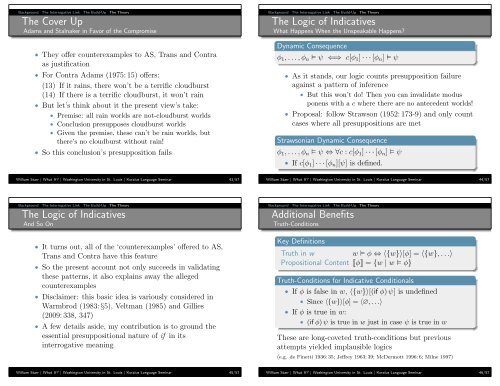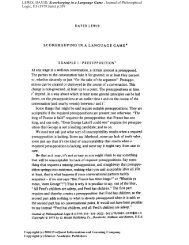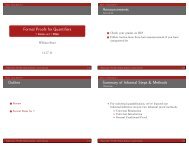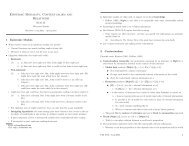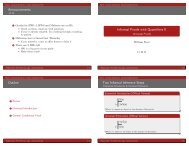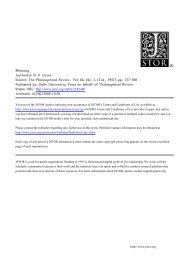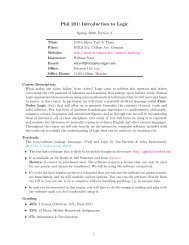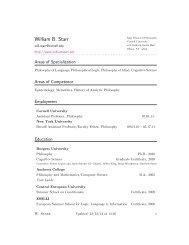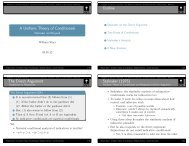What If? - Will Starr
What If? - Will Starr
What If? - Will Starr
Create successful ePaper yourself
Turn your PDF publications into a flip-book with our unique Google optimized e-Paper software.
Background The Interrogative Link The Build-Up The Theory<br />
The Cover Up<br />
Adams and Stalnaker in Favor of the Compromise<br />
• They offer counterexamples to AS, Trans and Contra<br />
as justification<br />
• For Contra Adams (1975: 15) offers:<br />
(13) <strong>If</strong> it rains, there won’t be a terrific cloudburst<br />
(14) <strong>If</strong> there is a terrific cloudburst, it won’t rain<br />
• But let’s think about it the present view’s take:<br />
• Premise: all rain worlds are not-cloudburst worlds<br />
• Conclusion presupposes cloudburst worlds<br />
• Given the premise, these can’t be rain worlds, but<br />
there’s no cloudburst without rain!<br />
• So this conclusion’s presupposition fails<br />
Background The Interrogative Link The Build-Up The Theory<br />
The Logic of Indicatives<br />
<strong>What</strong> Happens When the Unspeakable Happens?<br />
Dynamic Consequence<br />
φ 1 , . . . , φ n ψ ⇐⇒ c[φ 1 ] · · · [φ n ] ψ<br />
• As it stands, our logic counts presupposition failure<br />
against a pattern of inference<br />
• But this won’t do! Then you can invalidate modus<br />
ponens with a c where there are no antecedent worlds!<br />
• Proposal: follow Strawson (1952: 173-9) and only count<br />
cases where all presuppositions are met<br />
Strawsonian Dynamic Consequence<br />
φ 1 , . . . , φ n ψ ⇔ ∀c : c[φ 1 ] · · · [φ n ] ψ<br />
• <strong>If</strong> c[φ 1 ] · · · [φ n ][ψ] is defined.<br />
<strong>Will</strong>iam <strong>Starr</strong> | <strong>What</strong> <strong>If</strong> ? | Washington University in St. Louis | Koralus Language Seminar 43/57<br />
<strong>Will</strong>iam <strong>Starr</strong> | <strong>What</strong> <strong>If</strong> ? | Washington University in St. Louis | Koralus Language Seminar 44/57<br />
Background The Interrogative Link The Build-Up The Theory<br />
The Logic of Indicatives<br />
And So On<br />
• It turns out, all of the ‘counterexamples’ offered to AS,<br />
Trans and Contra have this feature<br />
• So the present account not only succeeds in validating<br />
these patterns, it also explains away the alleged<br />
counterexamples<br />
• Disclaimer: this basic idea is variously considered in<br />
Warmbrod (1983: §5), Veltman (1985) and Gillies<br />
(2009: 338, 347)<br />
• A few details aside, my contribution is to ground the<br />
essential presuppositional nature of if in its<br />
interrogative meaning<br />
Background The Interrogative Link The Build-Up The Theory<br />
Additional Benefits<br />
Truth-Conditions<br />
Key Definitions<br />
Truth in w w φ ⇔ 〈{w}〉[φ] = 〈{w}, . . .〉<br />
Propositional Content φ = {w | w φ}<br />
Truth-Conditions for Indicative Conditionals<br />
• <strong>If</strong> φ is false in w, 〈{w}〉[(if φ) ψ] is undefined<br />
• Since 〈{w}〉[φ] = 〈∅, . . .〉<br />
• <strong>If</strong> φ is true in w:<br />
• (if φ) ψ is true in w just in case ψ is true in w<br />
These are long-coveted truth-conditions but previous<br />
attempts yielded implausible logics<br />
(e.g. de Finetti 1936: 35; Jeffrey 1963: 39; McDermott 1996: 6; Milne 1997)<br />
<strong>Will</strong>iam <strong>Starr</strong> | <strong>What</strong> <strong>If</strong> ? | Washington University in St. Louis | Koralus Language Seminar 45/57<br />
<strong>Will</strong>iam <strong>Starr</strong> | <strong>What</strong> <strong>If</strong> ? | Washington University in St. Louis | Koralus Language Seminar 46/57


